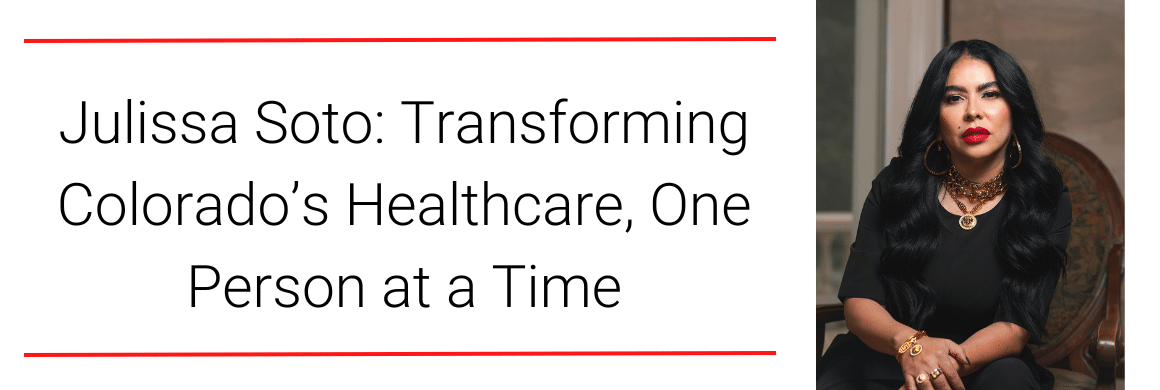Hispanic Heritage Month is in full swing, running from September 15 to October 15. During this time, we acknowledge and honor the contributions of Hispanic and Latino Americans. In Colorado’s public health and immunization world, there is no one more deserving of this acknowledgement and honor than Julissa Soto. Soto is CEO and founder of Julissa Soto Latino Health Equity Consulting. Her story is one of perseverance, love for her own Latino community, and love for all people. She has an unwavering determination to rattle the healthcare system until there is equitable access to healthcare for everyone.
Soto has mounted an impressive list of interviews and news articles. She has been featured in local news and nationally on NPR and Time. Soto even gave a TEDx Mile High talk last June. The awards she’s received both locally and nationally are far too many to list. Most recently, she was given the prestigious 2023 Association of Immunization Managers (AIM) Immunization Champion Award. AIM selects honorees for each state who go above and beyond to promote vaccines in their communities. The boards and organizations in which she participates are also too many to list. Her work has helped vaccinate over 24,000 Latino people in Colorado who otherwise may have gone unvaccinated and unprotected from preventable diseases. What’s most commendable, though, is not the articles, awards, affiliations, or even the vaccines she’s helped get in arms. It’s the way Soto is changing the reach of healthcare in Colorado by facilitating a culturally affirming connection between un- and underserved communities and the healthcare system.
What does healthcare currently look like for Latinos in Colorado?
We’ve got work to do! Data shows that Latinos are behind in nearly all health metrics compared to whites, including vaccinations. Soto knows we’ve got to change the current model. What works for some does not work for all. As she says, “for the sake of our Latino children and their parents, we shouldn’t just be doing things the way we’ve always done them…We need to train health teams how to utilize cultural validation in a way that builds trust in health and opens access.”
Fixing the problem. Whose responsibility is it?
As Soto sees it, healthcare is a human right, and unfortunately in the U.S., “having a pediatrician is a privilege.” She believes the onus to change is not on the community, but rather on those who hold the power within the system. She believes “advocating for the marginalized communities is a social responsibility even when it’s not profitable in the short term. Validating and respecting the culture but also educating through authentic community engagement is the only way to turn the negative equity direction around, our social responsibility in public health.”
What does changing healthcare look like to Soto?
Soto knows first-hand the inequities that exist in healthcare. She knows what it’s like to be lost in a system that expects people to come to it – with fear, with trauma, with language barriers, without trust, and without the knowledge and tools to navigate it. Her answer to making healthcare equitable:
“[G]et into the community to build trust. After all, if Latinos aren’t utilizing primary care it’s because of mistrust and access. Going into the community, getting out from behind that intimidating barrier of the table that dulls interaction with people, and meeting and greeting community authentically, showing genuine interest, and caring, that’s what changes mistrust into trust and opens doors of access. It’s the only real way to do so.”
Soto herself brings healthcare to churches by hosting Vaccine Sundays. She’s brought healthcare to schools through the One School, One Vaccine at a Time (Una Escuela, Una Vacuna a la Vez) initiative in partnership with Immunize Colorado. She’s even hosted clinics at carnicerías, or meat markets. Whenever she hosts a clinic, it is at a time and a place that is convenient for the community. Food and fun are mandatory elements of cultural validation, a practice Soto recognizes as a way to build trust between people and the healthcare system. At her clinics, you’ll find face painting, balloons, and superhero costumes along with enchiladas, frijoles, y arroz (beans and rice). As she says, “for the sake of our Latino children and their parents, we shouldn’t just be doing things the way we’ve always done them.”
Soto’s work will not only transform healthcare, it will transform our communities.
Soto is closing the gap between healthcare and the Latino community. The health inequities faced by Latinos are complex. They have implications far beyond healthcare and impact our education system, our environment, our economy, and more. Soto’s work to facilitate meaningful connections and build trust between Latinos and our healthcare system will also impact these other pillars of our community–one person at a time.
Immunize Colorado was formed in 1991 in response to alarmingly low vaccination rates across the state. At the time, only about 50% of Colorado’s children were adequately vaccinated. A group of physicians and other concerned individuals came together to strategize how to prevent protect Coloradans from vaccine-preventable diseases and increase vaccine uptake. Much work remains. You can donate or discover other ways to get involved in supporting our commitment to healthy Colorado communities today!

